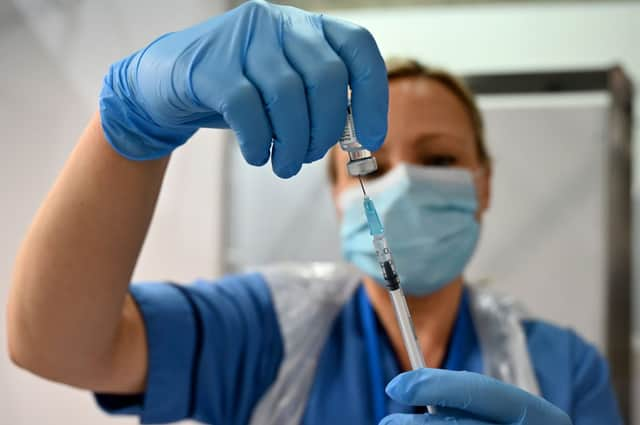Booster vaccines should protect people against Omicron, new study suggests


Booster vaccines should protect people from falling seriously unwell from the Omicron Covid variant, a new study suggests.
The new data also shows that using the Pfizer or Moderna vaccine as a booster dose offers the most significant rise in immunity levels.
Advertisement
Hide AdAdvertisement
Hide AdIn a trial of six vaccines, the two mRNA jabs topped the list with both triggering the biggest rise in Covid antibodies.
What the study found
In the study, six vaccines were tested as a third dose, they were:
AstraZeneca
Pfizer/BioNTech
Moderna
Novavax
Janssen (made by Johnson and Johnson)
CureVac (which has ceased production)
Professor Saul Faust, trial lead and director of the NIHR Clinical Research Facility at University Hospital Southampton NHS Foundation Trust, said the study had shown that those vaccines are safe and effective boosters for people who had already had two doses of AstraZeneca or Pfizer.
“All of the vaccines in our study do show a statistically significant boost… RNA (Pfizer and Moderna) very high, but very effective boosts from Novavax, Janssen and AstraZeneca as well,” Prof Faust said.
Advertisement
Hide AdAdvertisement
Hide AdAlthough Omicron was not tested specifically in the study, he added that the vaccines worked well against existing variants.
Asked specifically about the new strain, he said: “Our hope as scientists is that protection against hospitalisation and death will remain intact.”
Samples from the study have now been passed to the UK Health Security Agency (UKHSA) to look at how well the Omicron variant can be neutralised by vaccines.
No safety concerns with the vaccines
The data showed that all vaccines tested posed no safety concerns with fatigue, headache and sore arm the most commonly reported issues.
Advertisement
Hide AdAdvertisement
Hide AdWhen looking at antibody levels in the trial, people who had received two doses of AstraZeneca initially had booster responses that were between 1.8 times higher to 32.3 times higher depending on the booster vaccine used.
After two doses of Pfizer, the range was 1.3 times higher to 11.5 times higher.
More information will be published early next year which will look at whether a longer period between second and third doses improves the response.
Prof Faust said: “It’s really encouraging that a wide range of vaccines, using different technologies, show benefits as a third dose to either AstraZeneca or Pfizer/BioNTech.
Advertisement
Hide AdAdvertisement
Hide Ad“That gives confidence and flexibility in developing booster programmes here in the UK and globally, with other factors like supply chain and logistics also in play.”
The new CovBoost trial, published in The Lancet, involved 2,878 people aged 30 or over receiving a booster 10 to 12 weeks after their initial two-dose vaccination.
UK orders 114m extra Covid doses
The trial results come as the UK has ordered an extra 114 million doses of Moderna and Pfizer vaccines which will be rolled out over 2022 and 2023.
All adults aged over 18 will be offered a third dose by the end of January but the purchase of the additional vaccines suggests a fourth vaccine could be rolled out.
Advertisement
Hide AdAdvertisement
Hide AdThe head of Pfizer earlier this week claimed that booster jabs - which can cut the risk of infection by more than 93% - could become an annual event.
A version of this article originally appeared on NationalWorld.com